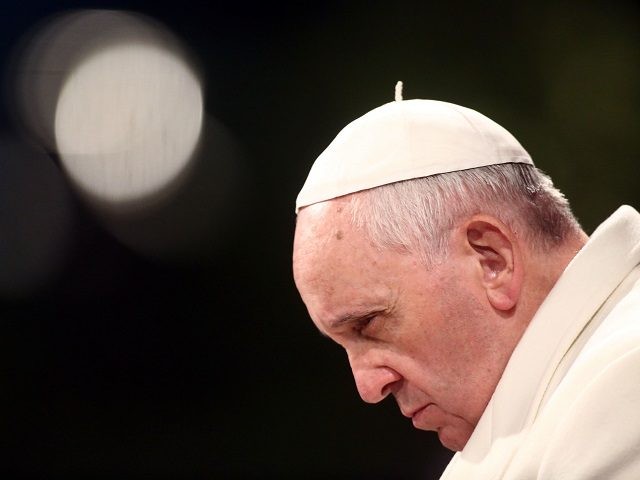The former doctrinal chief of the U.S. Bishops Conference (USCCB) has written a forceful letter to Pope Francis, criticizing the pontiff’s “intentionally ambiguous” teaching, derision of conservatives and resistance to constructive criticism.
Capuchin Father Thomas Weinandy, who was named to the Vatican’s International Theological Commission by Pope Francis himself in 2014, told Crux that he only wrote the letter and eventually released it for publication after much prayer and discernment, as Pope Francis often recommends.
“If I did write something, I wanted it to be of help to Pope Francis, to the Church, and to the faithful,” he said.
Although Weinandy wrote the letter last July, he only made it public after he received assurances from the Vatican that it had been delivered to the Pope. He chose publish the letter, he said, because it “expresses the concerns of many more people than just me, ordinary people who’ve come to me with their questions and apprehensions.”
“I wanted them to know that I listened,” he said.
In the letter, Father Weinandy lists five points that illustrate the “chronic confusion” that seems to mark the Francis pontificate, namely, intentional ambiguity, disdain for doctrine, the naming of heterodox bishops, sowing division in the Church, and vindictiveness in the face of criticism.
First, the theologian writes, the Pope’s guidance “at times seems intentionally ambiguous,” inviting conflicting theories as to what he actually means and leaving the faithful confused and spiritually adrift. “To teach with such a seemingly intentional lack of clarity inevitably risks sinning against the Holy Spirit, the Spirit of truth,” the priest notes.
The Pope furthermore seems to “censor and even mock” those who interpret the pontiff’s words in accord with Church tradition, labelling them as “Pharisaic stone-throwers who embody a merciless rigorism,” he writes.
Such behavior by the Pope and his advisors “gives the impression that your views cannot survive theological scrutiny, and so must be sustained by ad hominem arguments,” Weinandy declares.
Second, “too often your manner seems to demean the importance of Church doctrine,” the priest states. “Again and again you portray doctrine as dead and bookish, and far from the pastoral concerns of everyday life.”
Yet while the Pope accuses his critics of making doctrine into an ideology, “it is precisely Christian doctrine,” the priest says, “that frees people from worldly ideologies and assures that they are actually preaching and teaching the authentic, life-giving Gospel.”
Devaluing the doctrines of the Church, on the other hand, means separation from Jesus, the author of truth, Weinandy warns.
Third, the theologian underscores the scandal experienced by many faithful Catholics over the Pope’s choice of some bishops, “men who seem not merely open to those who hold views counter to Christian belief but who support and even defend them.”
Not only the appointment of such poor shepherds but the Pope’s silence in the face of their teaching and pastoral practice “scandalizes believers, and even some fellow bishops,” Weinandy says.
This apparent lack of concern for the integrity of the Catholic faith “weakens the zeal of the many women and men who have championed authentic Catholic teaching over long periods of time, often at the risk of their own reputations and well-being,” he adds, which also makes them lose “confidence in their supreme shepherd.”
Fourth, whereas the Pope is commissioned by Christ to promote and strengthen the unity of the Church, the Pope’s actions and words often seem “intent on doing the opposite,” Weinandy states. To encourage a decentralization of doctrine and morals “can only lead to more theological and pastoral confusion,” he says, and generates fragmentation among the bishops.
Fifth, although Pope Francis has often publicly spoken of the need for open dialogue and even encouraged people to disagree with him, in point of fact, the pontiff has reacted sharply and vindictively against all those who dare oppose or question him, Weinandy suggests, leading bishops to hold their tongues rather than risk reprisals.
“Bishops are quick learners, and what many have learned from your pontificate is not that you are open to criticism, but that you resent it,” he writes. “Many fear that if they speak their mind, they will be marginalized or worse.”
The “chronic confusion” fueled by the pontiff’s words and actions, Weinandy suggests, has forced many faithful Catholics into silence while offering heterodox Catholics license to freely proclaim their errors with no fear of correction.
Perhaps Jesus has allowed this confusion, he proposes, “to manifest just how weak is the faith of many within the Church, even among too many of her bishops.”
The priest’s letter follows on a series of other open questions, petitions, letters and corrections directed at Pope Francis by concerned Catholics, but bears particular relevance because of Father Weinandy’s theological stature and intellectual prestige after years at the helm of the USCCB’s doctrinal department.
If he follows his usual methodology, Pope Francis will not respond directly to the concerns and criticisms levelled by Father Weinandy, but will leave such a response to the circle of his most zealous defenders.
Paradoxically — if history is any guide — most of these will attempt to discredit the priest’s overture not by considered argument, but through the very sort of ad hominem attacks denounced in his letter.
Follow Thomas D. Williams on Twitter Follow @tdwilliamsrome

COMMENTS
Please let us know if you're having issues with commenting.